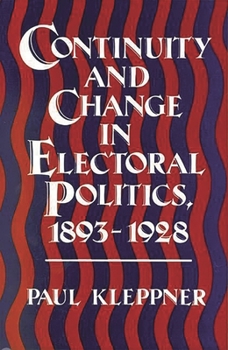Continuity and Change in Electoral Politics, 1893-1928.
Kleppner's study represents an attempt to move beyond the older voting studies by questioning their underlying assumptions and analyzing the changes that occurred at the beginning of the twentieth century. Rejecting the view that partisan identification is a nearly unchangeable psychological attachment, he argues that twentieth century voters were more likely to respond to short-term factors--fluctuations in the economy, charismatic candidiates, etc.--than their nineteenth century counterparts. This reexamination of long-held theories will provide new insight into assumptions about the links between cultural and ethnic values and party affiliation.
Format:Hardcover
Language:English
ISBN:0313240698
ISBN13:9780313240690
Release Date:March 1987
Publisher:Praeger
Length:284 Pages
Weight:1.50 lbs.
Dimensions:0.7" x 6.1" x 9.2"
Customer Reviews
0 rating





